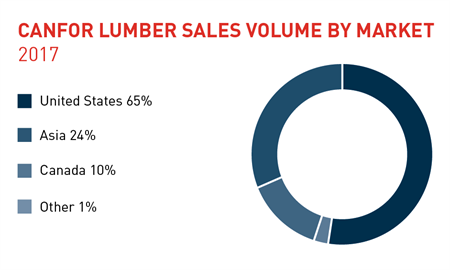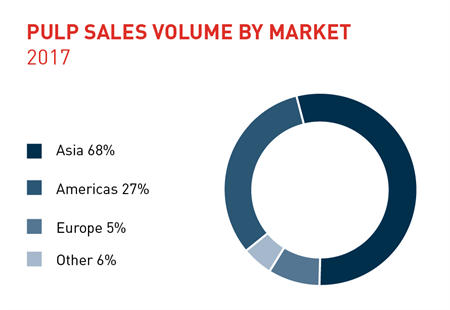Markets and Market Development
Canfor and Canfor Pulp sell lumber, pulp and paper products in markets throughout North America and overseas through sales offices in Vancouver; El Dorado, AR, Ridgeland, MS, Mobile, AL; Tokyo, Japan; Shanghai, China; and Seoul, South Korea.
In addition to our own products, we market lumber produced externally to complement our product line. Our continued expansion and focus on higher-value products has fuelled our diversification in both products and markets.
A significant and increasing proportion of our lumber is made up of specialty and high-value products, including Square Edge lumber for the North American market, J-Grade lumber for the Japanese market, and machine stress-rated (MSR) lumber used in engineered applications such as roof tresses and floor joists. We have expanded our product offering in recent years to include high-value engineered wood products, higher-grade MSR lumber, and premium one-inch boards.
While our largest market for lumber continues to be the United States, we are shipping more to offshore markets, especially China where there is growing acceptance of North American wood products for construction. For the third year, customers from China visited our mills in British Columbia so they could have a chance to see our operations and so we could better understand their needs. The tour focused on our specialty products and included tours of three mills in southeast British Columbia – Radium, Elko and WynnWood.
As a major supplier of dimension lumber to China, we are well positioned to deliver higher-value products. Shanghai Doorway, the lumber supplier for the Sino-Canadian Low-Carbon Eco-District Demonstration Project, Tianjin, is using our #2 and better grade for this project. The demonstration project is using Canadian lumber, technology and know-how to help China address climate challenges. It is the first worldwide large-scale deployment of the Super E® energy-efficient standard, developed by Natural Resources Canada.
In June, Canfor CEO Don Kayne visited the Eco-District project as part of a trade mission to China led by the Honourable Jim Carr, Canada's natural resources minister. In November, we were represented on an Asian trade mission to key markets in China and Japan, led by the Honourable Doug Donaldson, British Columbia minister of forests, lands, natural resource operations and rural development. The mission included the third Sino-Canada Wood Conference in Shanghai that explored ways British Columbia wood products can meet market demands and help China deliver a greener future.
Canfor was at BC Wood’s 14th annual Global Buyers Mission in Whistler, BC, in September, an event attended by registered international buyers from 19 countries.
We were represented at the China (Zhejiang province)-US Business Roundtable in August, and signed an MOU with Zhejiang Materials Industry Senhua Group Co. Ltd. (ZMIS) to establish a long-term strategic partnership to develop and utilize North American lumber in China.
In July, our Mobile, AL, sawmill welcomed representatives from the Southern Forest Products Association. The association’s mission is to advance the southern pine lumber industry in domestic and international markets, and staff wanted a firsthand look at southern pine operations.
In addition to looking for ways to expand our market reach, we continue to work with North American industry organizations such as the Softwood Lumber Board to promote the benefits and uses of softwood lumber in outdoor, residential and non-residential construction. In 2017, SLB-funded initiatives grew the demand for softwood lumber by more than a billion board feet. This includes raising awareness about opportunities for tall mass timber projects like award-winning Brock Commons in Vancouver. When it opened in July 2017, the 18-storey student residence was the world’s tallest wood building – and much of the specialty lumber used to build it came from our British Columbia sawmills in Radium Hot Springs and Elko.
The US-Canada softwood lumber dispute continued through 2017 and into 2018. In 2016, the US Lumber Coalition filed a petition to the US Department of Commerce and the US International Trade Commission alleging certain subsidies and administered fees below the fair market value of timber that favour Canadian lumber producers. On Dec. 7, 2017, the US International Trade Commission approved final determinations from the US Department of Commerce for both countervailing and anti-dumping duties. We are disappointed by these decisions, and will continue to support actions by the Government of Canada to resolve this issue.
Most of the lumber destined for North America is shipped by truck and rail, while the vast majority of products sold offshore are transported by container ship and, in the case of pulp export, breakbulk cargo.
We are expanding our market presence in Malaysia, working with a customer who is interested in producing treated southern yellow pine lumber. We continue to explore opportunities for softwood lumber in Indonesia and India, which are both facing a shortage of tropical hardwoods.

Canfor Pulp is a global leader in the NBSK segment with more than 50% of the pulp production directed to the specialty end-use segments that include electrical papers, non-woven applications, abrasive papers, masking tape, fibre cement, décor, filtration, label papers and many more. The reinforcing fibres are also used in the premium tissue market and high-end printing and writing grades.
Canfor Pulp has two wholly owned subsidiaries that market pulp – Canfor Pulp Japan Corporation in Tokyo and Canfor Korea Ltd. in Seoul. Premium 1 Papers, a sales and marketing partnership between Canfor Pulp and Canadian Kraft Paper Industries Limited (CKPI), is responsible for marketing all bleached and unbleached kraft paper products produced by our Prince George Pulp and Paper Mill and CKPI’s unbleached kraft paper mill in The Pas, Manitoba.
Through a cooperative sales and marketing agreement called Fibre United, Canfor Pulp and Finnish-based UPM Pulp provide customers with a wide range of products in China, Japan, Europe and North America. In 2016, we announced that Fibre United would expand to Korea, the world’s fifth-largest pulp market.

Canfor and Canfor Pulp both work hard to gain a better understanding of our customers in markets around the globe. By understanding our customers’ needs, we contribute to their success.
Canfor Pulp technical services, innovation and sustainability staff contact customers directly through TEMAP, our technical marketing program. We use customer interactions, presentations and seminars to learn more about customer needs so we can serve them better.
Canfor Pulp partners with internationally recognized experts to deliver training on refiner fundamentals, and to support tissue customer optimization studies. Our extensive technical collaborations with equipment manufacturers and specialty paper producers have continued to support our growing expertise in helping our customers develop new and improved products. We provide secure product delivery by coordinating with transportation partners worldwide.